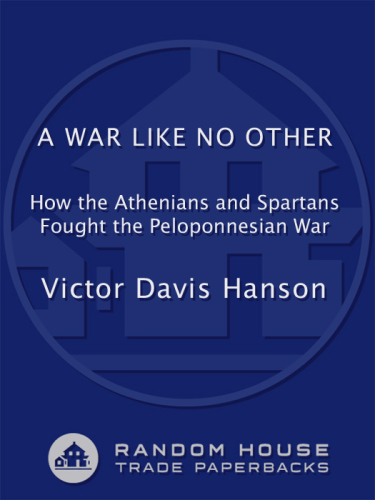
A War Like No Other
How the Athenians and Spartans Fought the Peloponnesian War
کتاب های مرتبط
- اطلاعات
- نقد و بررسی
- دیدگاه کاربران
نقد و بررسی

July 18, 2005
Hanson (Warfare and Agriculture in Classical Greece
, etc.) presents an elegant, lucidly written analysis of the 27-year civil war, a "colossal absurdity," that ended in Athens's 5th-century B.C. loss to Sparta and the depletion of centuries of material and intellectual wealth. Hanson deftly chronicles these destructive decades, from the conflict's roots (e.g., the fundamental mutual suspicion between Athens and Sparta) to its legacy (the evolution of the nature of war to something "more deadly, amorphous, and concerned with the ends rather than the ethical means"). Hanson considers the war's economic aspects and the ruinous plague that struck Athens before delving into his discussion of warfare. He offers a tour de force analysis of hoplite (or infantry) combat, guerrilla tactics, siege operations and sea battles in the Aegean. Though landlocked Sparta ultimately brought down Athens's once-great naval fleet and replaced democracy with oligarchy by 404 B.C., Hanson complicates the received notion of a lost Hellenic Golden Age. Throughout this trenchant military and cultural history, he draws parallels between the Peloponnesian War and modern-day conflicts from WWII to the Cold War and Vietnam. Across the centuries, these are lessons worth remembering.

September 15, 2005
By the standards of modern mass warfare, the Peloponnesian War, which ravaged Greece for 27 years, was a small-scale affair. The military forces were relatively small, and the weapons seem primitive. But by the standards of the classical Greek world, this conflict was massive and devastating. Hanson is a classicist and military historian, and his concise and stirring account of the war lacks the comprehensive scope of Donald Kagan's definitive work," The Peloponnesian War" (2003). However, as a strictly military account, Hanson has written a first-rate chronicle, capturing the intensity and savagery of ancient warfare and conveying how ordinary warriors must have experienced it. Hanson has a gift for explaining both strategic objectives and relatively complicated tactical maneuvers in terms easily understandable by laymen. In his portrayals of some of the key players, Hanson provides interesting insights, especially concerning some rather obscure but important figures. For general readers and history buffs who hope to gain a solid understanding of this seminal and tragic conflict, this is an ideal.\b (Reprinted with permission of Booklist, copyright 2005, American Library Association.)

























دیدگاه کاربران